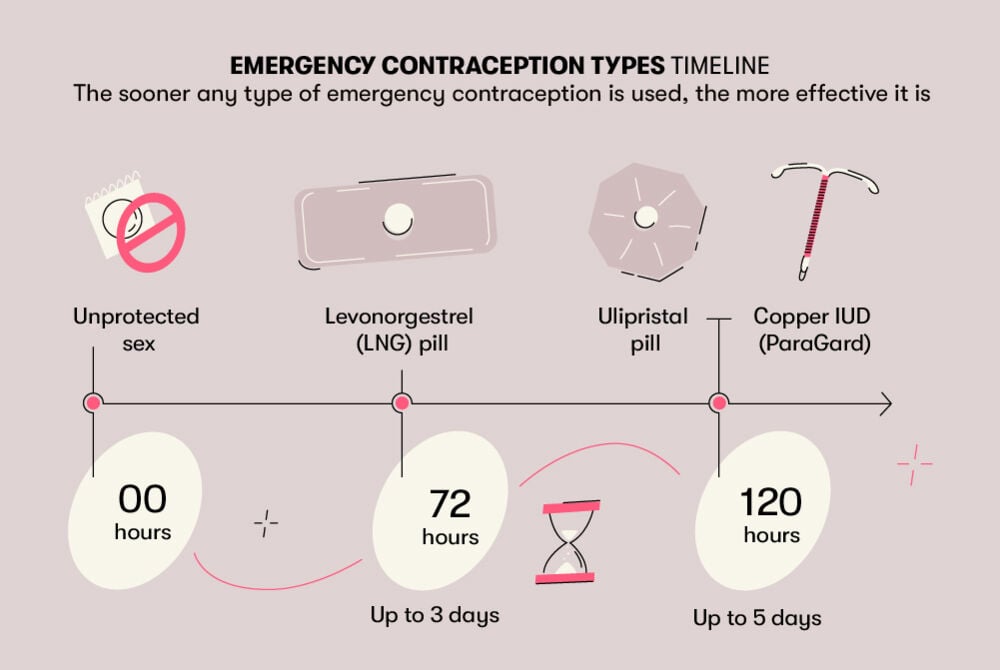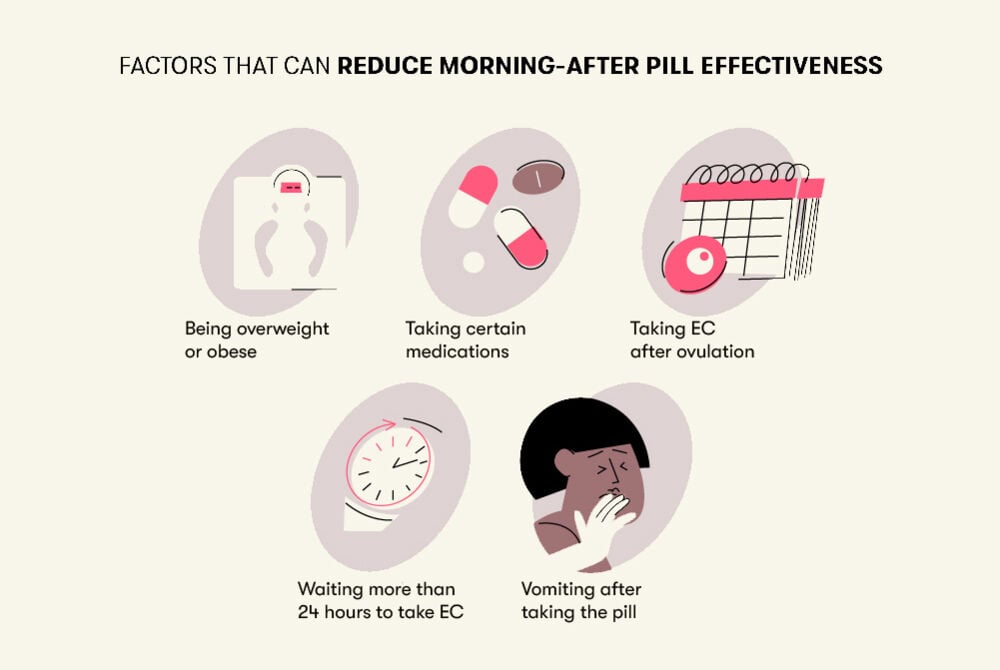Emergency contraception can stop you from getting pregnant if you’ve had unprotected sex or your birth control method didn’t work. But you may wonder, how effective is Plan B, really? Does it always work? For this Flo article, we asked experts all about the morning-after pill and whether you can still get pregnant after taking Plan B. Let’s dive in!
-
Tracking cycle
-
Getting pregnant
-
Pregnancy
-
Help Center
-
Flo for Partners
-
Anonymous Mode
-
Flo app reviews
-
Flo Premium New
-
Secret Chats New
-
Symptom Checker New
-
Your cycle
-
Health 360°
-
Getting pregnant
-
Pregnancy
-
Being a mom
-
LGBTQ+
-
Quizzes
-
Ovulation calculator
-
hCG calculator
-
Pregnancy test calculator
-
Menstrual cycle calculator
-
Period calculator
-
Implantation calculator
-
Pregnancy weeks to months calculator
-
Pregnancy due date calculator
-
IVF and FET due date calculator
-
Due date calculator by ultrasound
-
Medical Affairs
-
Science & Research
-
Pass It On Project New
-
Privacy Portal
-
Press Center
-
Flo Accuracy
-
Careers
-
Contact Us
Does Plan B Always Work? Morning-After Pill Q&A with Experts


Every piece of content at Flo Health adheres to the highest editorial standards for language, style, and medical accuracy. To learn what we do to deliver the best health and lifestyle insights to you, check out our content review principles.
Can you still get pregnant after taking Plan B?
The morning-after pill, sometimes referred to by brand name Plan B, is a levonorgestrel emergency contraceptive (EC) pill that prevents pregnancy after unprotected sex or if your contraception failed (like if you forgot to take your birth control pills or the condom broke). It works by stopping an egg from being released from the ovary during ovulation, which prevents the egg from being fertilized if ovulation has already happened or prevents a fertilized egg from being implanted in the womb.
There are many brands of levonorgestrel EC pills that work in the same way. This type of EC works best when taken as soon as possible after unprotected sex, ideally within 12 hours.
When taken within 24 hours, levonorgestrel EC is 95 percent effective. If taken 48–72 hours after unprotected sex, the Plan B effective rate is 61 percent. The effectiveness of Plan B decreases the longer you wait, so taking it sooner is better!

After taking Plan B, you may feel some side effects, including nausea, abdominal pain, headache, dizziness, or vomiting. If you throw up within two hours of taking the pill, you should talk to a provider right away — you’ll need to get a second dose or use another form of emergency contraception, like the copper IUD, in order to prevent pregnancy.
The other type of morning-after pill has ulipristal acetate as the main ingredient and can prevent pregnancy when taken up to five days later. But they always work much better when taken within the first three days.
You may also ask yourself, does it matter when in your cycle you take an EC pill?
The short answer is yes. How effective Plan B is depends not only on how soon after unprotected sex you take it but also where you are in your cycle. For instance, if ovulation has already occurred (within 24 hours), EC may be less effective. This is one case where you can still get pregnant after taking Plan B. If you want to find out when you're likely to be ovulating, use this online ovulation calculator.
Let’s take a look at some research: a 2010 study of females aged 18–38 at a family planning clinic in Chile found that of 35 women who took a levonorgestrel pill on the day of ovulation or afterward, six of them got pregnant. On the other hand, of the 87 women who took it within five days before ovulation, none got pregnant.
The effectiveness of Plan B can also decrease when someone is overweight or obese. According to the CDC, if you have a BMI over 30, Plan B might be less effective.
A 2011 study published in the Contraception journal found that obese people were three times more likely to get pregnant after taking an EC pill than those with a normal body mass index.
For heavier people, experts recommend the copper IUD for emergency contraception. It’s actually the most effective form of EC. According to the NHS, less than 0.1 percent of people who get the copper IUD after unprotected sex get pregnant.
It’s also important to note that certain medications and supplements can reduce the effectiveness of Plan B. These include the antibiotic rifampin, antifungal griseofulvin, certain HIV medicines, some anti-seizure medicines, and the herb St. John’s Wort.
Take a quiz
Find out what you can do with our Health Assistant

Does Plan B work during ovulation?
Morning-after pills are most effective before ovulation. This is because they stop an egg from being released from the ovary so there’s no egg available to get fertilized by sperm. But if you’ve already ovulated, the pill may prevent sperm from fertilizing an egg.
If enough time has passed after unprotected sex and an egg has already been fertilized, Plan B may stop the egg from implanting in the uterus. But if the fertilized egg has already been implanted in the womb before taking Plan B, it’s unfortunately too late, and it won’t prevent pregnancy. Timing is key here.
After having sex, it can take up to six days for an egg to get fertilized and another three to four days for the fertilized egg to implant itself into the uterine lining. If you’re within your fertile window, using the copper IUD as emergency contraception is a safer option to avoid pregnancy.
It may also be helpful to know that if you take a morning-after pill and are already pregnant, it won’t harm the fetus.

Choosing birth control (18+)
Get answers to the most common questions, chat with our friendly chatbot and join other people around the world in secret chats.
How do I know if Plan B worked?
You’ll know if your emergency contraception worked when you get your next period, which could come within a week of when you expect. Your period may be heavier, lighter, earlier, or later than usual. EC pills can also cause some irregular bleeding or spotting afterward.
If you don’t get your period within three weeks after taking EC, take a pregnancy test. And if your period is more than a week late, you should also take a pregnancy test.
Can you take plan B on birth control?
Yes, you can take Plan B on birth control. If you forgot to take your birth control pill and had unprotected sex, you could take the morning-after pill to prevent an unplanned pregnancy. You can resume taking your birth control again right away. It’s best to use another form of contraception (like condoms) until your birth control is fully reliable again after the missed pill or pills.
Takeaway
In conclusion, you can still get pregnant after taking Plan B in certain circumstances, such as if a fertilized egg has already been implanted in your uterus; you have unprotected sex after taking the pill; you are overweight; or you take medications that reduce its effectiveness.
How effective Plan B is also depends on how soon you take it after unprotected sex and which day of your cycle it is. To prevent unplanned pregnancy, it’s essential to always use reliable contraception each time you have sex.
Morning-after pill FAQs

6 Things Your Doctor Wants You to Know About Emergency Contraception
Read medically reviewed articles on topics like this


Hey, I'm Anique
I started using Flo app to track my period and ovulation because we wanted to have a baby.


The Flo app helped me learn about my body and spot ovulation signs during our conception journey.


I vividly
remember the day
that we switched
Flo into
Pregnancy Mode — it was
such a special
moment.
Real stories, real results
Learn how the Flo app became an amazing cheerleader for us on our conception journey.




